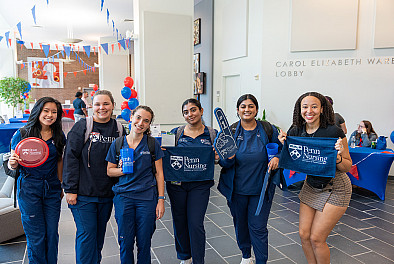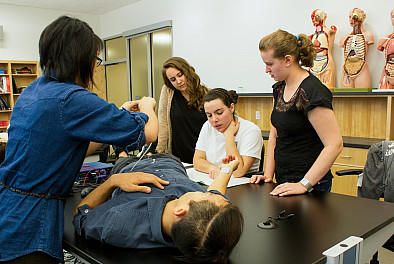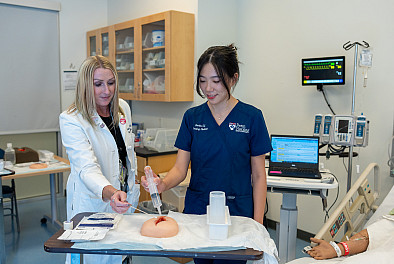Undergraduate Minors
Complement your BSN education with a secondary area of expertise.

A world-class city filled with art and culture and an incredible campus that offers cutting edge resources–that’s what students receive at Penn Nursing. And that’s just the start. Penn Nursing and the wider university offer something for everyone, as well as a lifelong community.

Penn Nursing is globally known for educating dynamic nurses—because our School values evidence-based science and health equity. That’s where our expertise lies, whether in research, practice, community health, or beyond. Everything we do upholds a through-line of innovation, encouraging our exceptional students, alumni, and faculty share their knowledge and skills to reshape health care.

Penn Nursing students are bold and unafraid, ready to embrace any challenge that comes their way. Whether you are exploring a career in nursing or interested in advancing your nursing career, a Penn Nursing education will help you meet your goals and become an innovative leader, prepared to change the face of health and wellness.

Penn Nursing is the #1-ranked nursing school in the world. Its highly-ranked programs help develop highly-skilled leaders in health care who are prepared to work alongside communities to tackle issues of health equity and social justice to improve health and wellness for everyone.

Penn Nursing’s rigorous academic curricula are taught by world renowned experts, ensuring that students at every level receive an exceptional Ivy League education. From augmented reality classrooms and clinical simulations to coursework that includes experiential global travel to clinical placements in top notch facilities, a Penn Nursing education prepares our graduates to lead.

Complement your BSN education with a secondary area of expertise.

Penn Nursing offers five minors. You may also pursue a minor in Penn’s School of Arts and Sciences or School of Engineering and Applied Science. If you are interested, meet with your Nursing advisor to build the minor into your plan of study. We often suggest that you take a course in your department of interest before formally declaring a minor.
Most minor programs require between six and nine courses. Depending on the specific minor, you may be able to fulfill the requirements through free electives or other courses. If not, you’ll need to take summer courses to complete it.
The ever-growing threat of pandemics, terrorism, natural disasters, and climate-related challenges has sharpened the need for skilled nurses who understand the global interconnectedness of health. We need nurses who are experienced both clinically and culturally, who are ready to meet the rapidly-changing needs of patients, no matter where they live.
Available exclusively to Penn Nursing students at both the undergraduate and graduate level, our Global Health minor is an opportunity to increase your knowledge of the world and the factors that contribute to the health of populations. We take a cross-disciplinary approach to help you integrate your knowledge of nursing, culture, and diversity to more effectively engage with patients locally, nationally, and around the world.
This six-course program—three core and three elective—is structured to address the social, cultural, environmental, and political factors that influence health. Students typically declare the Global Health minor in their sophomore year.
Click on the following links to view the curriculum and electives on the University catalog:
Curriculum Electives Language Electives
Contacts
Program Coordinator
Nancy Biller, MA, MPH
Assistant Dean for Global Health Affairs
(215) 573-3050
nbiller@nursing.upenn.edu
The process of communicating information to patients and colleagues is critical to successful healthcare efforts, no matter the setting. We understand the need for talented nurses who are adept at sharing knowledge, which is why we collaborate with the renowned Annenberg School for Communication to offer a Health Communication minor.
This minor expands your knowledge of communication process, theory, and behavior. It prepares you for professional roles developing cutting edge models for health behavior intervention as well as implementing patient education and health communications programs locally, nationally, and globally.
This is a six-course minor. In addition to a required course in research methodology, you’ll choose two of the following three courses: Critical Approaches for Popular Culture, Introduction to Communication Behavior, and Introduction to Mass Media and Society, and take three additional electives.
Click on the following links to view the curriculum and electives on the University catalog:
Contacts
Program Director
José A. Bauermeister
This innovative minor provides students with the tools and perspectives to study clinical issues through a different lens than the one provided by natural or social sciences, and amplifies the humanities components of the Judgement, Inquiry, Voice, and Engagement pillars that define the “Penn Advantage.”
Penn Nursing’s History, Health, & Humanities minor forges a bridge between the humanities and sciences to nourish students intellectually, build self-awareness, develop empathy, and consider social justice-related phenomena through a new lens. Throughout the minor’s six courses, it offers formalized opportunities for writing, both reflective and analytical, that extend beyond those available within the required nursing curriculum.
Students enrolled in the minor will be considered Bates Center associates and will be invited to lunches, dinners, and other events with visiting scholars and faculty.
Six course units are required to complete this minor, two of which must be nursing courses. Many courses around the university can meet these criteria and students are urged to discuss their interest with their advisor. Choice of courses for the minor must be approved by the director of the minor and the student’s faculty advisor.
Click on the following links to view the curriculum and electives on the University catalog:
Contacts
Program Director
Cynthia Anne Connolly
We’ve teamed up with Penn’s renowned Wharton School to offer a minor in Nursing and Health Services Management, a program designed to build the skills you need to give patients the care they deserve within the challenges of our modern healthcare system.
In some ways, the business environment in which health care institutions function has more of an impact on patient outcomes than the care providers themselves. We’ll help you understand both the nature of the constraints that face health care organizations and how these constraints can be effectively managed to provide the best possible healthcare for patients.
For this minor, you’ll be required to take a total of eight interdisciplinary courses. You’ll start with Microeconomics and then complete an additional two courses at Wharton, two courses at the School of Nursing, and three electives. Please note that Wharton students pursuing a concentration in Health Care Management may not also declare this minor.
Click the link below to view the curriculum and electives for this program in the University catalog.
Contacts
Program Director
Matthew McHugh
Our Nutrition minor—jointly sponsored by Penn Nursing and Penn Arts and Sciences—presents a broad view of nutrition and illustrates the pervasiveness of nutrition-related issues in such diverse disciplines as anthropology, neuroscience, economics, folklore, history, physiology, psychology, health care, and public policy. We push students to develop critical thinking skills by analyzing the role of nutrition in today’s society from the perspective of several academic disciplines. Students have flexibility in choosing courses from a core of basic science and nutrition courses, as well as interdisciplinary electives.
We expose students to a wide range of fields related to nutrition including anthropology, neuroscience, economics, history, physiology, psychology, health care, and public policy. In pursuing this minor, students will have significant flexibility in course selection. Our advising program will help craft a plan of study that best suits each student’s interests. The minor consists of a minimum of six courses taken for a grade.
Click on the following links to view the curriculum and electives on the University catalog:
Contact
Office of Academic Affairs
advisor@nursing.upenn.edu